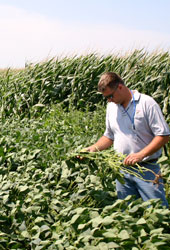Young Farmer Doubles the Size of His Farm
Using ARRA Funded Loan

Sioux County, Iowa - When Mark Kallsen graduated from college just over 10 years ago he knew he wanted to work in the agricultural industry, but didn’t think that would mean following in his dad’s footsteps as a farmer in northwest Iowa. Mark continued to help his dad on the farm throughout college, and when his dad’s health changed, Mark took on more responsibilities.
“At that time, I was 23 or 24 years old and had no equity in anything, and nothing to my name other than a car and some personal effects,” said Mark, who had secured a good job with a local seed company after graduation. “You go to a bank and understandably, they’re not too eager to loan you any money.”
Mark talked with friends and neighbors who suggested he contact the local Farm Service Agency (FSA) office to see if they could help.
“When it first started, cows and calves were the mainstay of the operation. I took some of the funds and purchased my dad's cattle,” he said. “As time progressed I wanted to be more involved in some of the farming.”
Using FSA operating loans, Mark rented some of the ground from his dad. He used the harvested crop to supply feed for the livestock and turn a profit. After a few years, Mark was able to buy his dad’s machinery with another FSA loan.
“I started small with the livestock,” he said. “I had to have some income from something, and the livestock was the easiest way to do that.”
Mark continued to rent the land from his dad for a number of years.
“That’s where it went for a couple years until the stimulus dollars came up at the beginning of this year and I was able to rent more ground,” said Mark.
Using an operating loan funded by the 2009 American Recovery and Reinvestment act, Mark was able to rent an additional 160 acres, immediately across from the existing 160 acre farm.
“The folks across the road called me and asked if I wanted to rent the land,” he said. “And with those dollars available at that low interest rate and since I have the equipment and everything right here, we moved forward with it.”
The roughly 320 acres that Mark farms are evenly split between soybeans and corn.
“I doubled the whole operation just by doing that one loan,” he said. “If I didn’t have the FSA cooperation it would have made things a lot harder and I would not have been able to expand as fast as I did.”
Mark says the experience of working with FSA has been a positive one in multiple ways. In addition to providing the funds needed to operate his farm between income from crops and cattle, the local FSA office works with Mark on balance sheets, providing another set of eyes to ensure the business runs smoothly.
“I hope to be here as long as I live and keep the farm in my name eventually, and I hope to buy more ground when it’s the right time,” he said. “Hopefully FSA can help me out at that time too.”